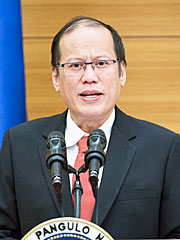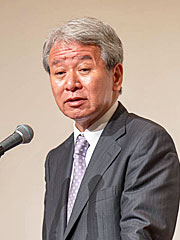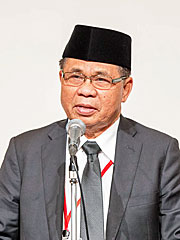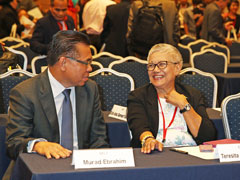An armed conflict that lasted over 40 years in the Mindanao Island in the south of the Philippines, the Moro Islamic Liberation Front and the government of the Philippines has ended, and the Comprehensive Agreement on the Bangsamoro was signed March 27. The Japan International Cooperation Agency, which has continuously supported the peace process, hosted the seminar Consolidation for Peace for Mindanao (COP6) June 23-25 in Hiroshima, a place widely recognized as a symbol of peace.
Some 90 Mindanao peace stakeholders gathered, including the Moro Islamic Liberation Front (MILF) Chair Al-Hajj Murad Ebrahim, a representative of the government of the Philippines, Secretary Teresita Quintos-Deles of the Office of the Presidential Adviser on the Peace Process (OPAPP), representatives of aid agencies and NGOs, and academic experts.

From left, Professor Kamarulzaman Askandar, University of Sains Malaysia; Al-Hajj Murad Ebrahim, chair of the Moro Islamic Liberation Front (MILF); Governor of Hiroshima Prefecture Hidehiko Yuzaki; Secretary Albert F. Del Rosario, Department of Foreign Affairs, the Philippines; President Benigno Simeon C. Aquino III; JICA President Akihiko Tanaka; Secretary Teresita Quintos-Deles of the Office of the Presidential Adviser on the Peace Process (OPAPP); Professor Miriam Coronel-Ferrer, chair, the Philippines’ Government Peace Panel; and Mohagher Iqbal, chair of the MILF Peace Panel
During the seminar, President Benigno Simeon C. Aquino III visited Japan and participated in a seminar June 24 to give a keynote speech to the people involved. He said while the path to peace is filled with obstacles, leaders should never forget it is the citizens who will pay the ultimate price, touching on the tragedy that struck Hiroshima and Nagasaki about 70 years ago, and he expressed his strong determination to drive forward the peace process.
President Aquino also expressed his deep gratitude for mediation by the international community, including the Japanese government’s contribution to realizing the first talks between him and Murad in August 2011, which became a turning point in building mutual trust. After the speech, the president shook hands firmly with Murad and Mohagher Iqbal, chair of the MILF Peace Panel.

President Benigno Simeon C. Aquino III
Providing an opportunity for parties to the peace negotiations to engage in discussion through a third party

JICA President Tanaka
Co-hosted by JICA and University of Sains Malaysia (USM), COP has been held in Malaysia five times since 2006, positioning the seminar as a place for candid dialogue for stakeholders who have influence on the peace process. Following the Comprehensive Agreement on the Bangsamoro (CAB) in March, this time, the sixth iteration of the seminar, was held in Japan for the first time.
A public forum to mark the start of the seminar was held at International Conference Center Hiroshima on June 23. Some 180 people attended including media and the general public, in addition to the stakeholders of the Mindanao peace process.
At the beginning of the forum, JICA President Akihiko Tanaka gave welcoming remarks. He said that JICA assigns its staff member to the International Monitoring Team for Mindanao, and that it has been providing assistance on strengthening the capacity of strategic personnel in key local institutions and addressing the basic needs of communities in the region, looking forward to the post-peace process in the framework of J-BIRD (1). Further, he touched on JICA’s assistance to conflict-affected areas in Mindanao through various actions including setting up opportunities for exchanging opinions among the stakeholders of the peace process. He went on to say that the comprehensive peace agreement will contribute to the development of not only the Bangsamoro (2), but also the Philippines nationwide, and moreover it will affect security and peace throughout ASEAN, pointing out that the Mindanao case will be a good model of conflict resolution in other regions of the world.
As the co-host, Professor Kamarulzaman Askandar of USM touched on the history of COP and emphasized that open discussions involving third parties from other conflict-affected areas have led to furthering comprehension among the stakeholders.
Also, Hiroshima Mayor Kazumi Matsui made remarks as a guest speaker from the host city, talking about hopes for realizing everlasting peace in the world.
It is important to make decisions based on our own will

Moro Islamic Liberation Front Chair Al-Hajj Murad Ebrahim
Next, Murad and Quintos-Deles gave keynote speeches.
“When the agreed upon details are put into action, it becomes meaningful. The most important thing in formulating institutions based on the agreement is to decide by our own will,” Murad said.
“In Hiroshima I witnessed the joy of reconstruction and hope. After the enactment of the Bangsamoro Basic Law, a referendum in 2015, then a parliamentary election in 2016 are planned. Overcoming every barrier, a miracle is about to happen in peace,” Quintos-Deles said, conveying her future vision.
A panel discussion was held at the closing of the public forum. In addition to Miriam Coronel-Ferrer, chair of the Government of the Philippines Peace Panel, and Iqbal, chair of the MILF Peace Panel, the following people appeared as panelists: Guiamel Alim, chair of Consortium of Bangsamoro Civil Society, an aggregation of NGOs involved in the Bangsamoro issue, and Keizo Takewaka, director general of the Department of General Affairs in JICA. The panelists discussed post-CAB challenges.
Building an inclusive region that benefits all residents
During the course of the three-day main sessions, the participants, including development partners and people from academia, discussed 1) Bangsamoro socio-economic development, 2) institutionalization of the Bangsamoro government, and 3) developments in normalization based on presentations of the central players, the government of the Philippines and the MILF Peace Panel (3).
Regarding achievements of the seminar, the Hiroshima Declaration on Realization of the Bangsamoro was adopted on June 25, and the seminar came to an end with closing remarks by JICA Vice President Shigeru Kiyama.

MILF Chair Murad, left, and Secretary Teresita Quintos-Deles of the OPAPP, prepare to adopt the Hiroshima Declaration on the Realization of Bangsamoro.
Regarding socio-economic development, the Hiroshima Declaration says it is important for all the people of the Bangsamoro to voluntarily participate for inclusive development. At the time of the establishment of the Bangsamoro government in 2016, it will be important to respect democratic principles, in particular fair and equitable participation, and for the normalization of public order, the principles of fundamental human rights, it says.
The declaration also includes a clause related to gender-responsive governance to provide women with opportunities. Prior to its announcement, JICA hosted a side event entitled “Women’s New Role in Peacebuilding Process.” Coronel-Ferrer presented on women’s role in the peace negotiation process, and discussions were held on the current situation of the women in the conflict affected areas, expected roles of the women and so on.
Murad, commenting on the fruits of the seminar, said, “The seminar was held at the right time, and it is commendable that many stakeholders of the peace process participated. I hope a transition process will move forward, triggered by this seminar.”
Quintos-Deles said, “Sometimes you have to leave home to speak better to someone you need to speak to at home. Sometimes you need to be in a different environment to hear better what the other one has been saying all along. In this light, COP6 has once again provided the opportunity for such enhanced and meaningful conversations among peacemakers focused on the Bangsamoro peace process. It has come at the most opportune time as the process shifts from negotiation to implementation with the signing of the Comprehensive Agreement on the Bangsamoro (CAB) Last March. It has happened at the most appropriate venue as the city and people of Hiroshima continue to hold out the flame of peace for the world to follow. We thank the organizers, JICA and USM, for organizing COP6 in faithful and strategic accompaniment of the Bangsamoro peace process.”
Before the peace agreement in 2003, JICA has provided assistance from 2003 such as small-scale infrastructure improvements and assistance in agriculture and poverty reduction. Through the Comprehensive Capacity Development Project for Bangsamoro, JICA will continue to proactively involve itself in the peace process to create the systems and institutions for the new Bangsamoro government, for capacity building of human resources, and for formulation of a regional development plan.
Notes:
- 1 . Japan-Bangsamoro Initiatives for Reconstruction and Development, established during the visit of then Prime Minister Shinzo Abe to the Philippines. It is an inclusive term of Japanese assistance for peace and security in Mindanao.
- 2 . The collective term of the Filipino Muslim is Moro, and their resident areas are called Bangsamoro.
- 3 . Established in February 2013 in preparation for the inauguration of new Bangsamoro government, mainly in charge of the formulation of the basic law. Mohagher Iqbal, chair of MILF Peace Panel, plays the role of chair.
- JICA President Akihiko Tanaka's Opening Remarks at the Seminar on the "Consolidation for Peace for Mindanao"




scroll